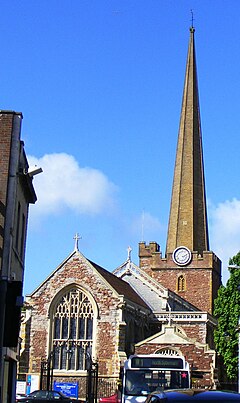Church of St Mary, Bridgwater
| Church of St Mary | |
|---|---|
 |
|
|
Location within Somerset
|
|
| General information | |
| Town or city | Bridgwater |
| Country | England |
| Coordinates | 51°07′40″N 3°00′17″W / 51.1279°N 3.0048°W |
| Completed | 13th century |
The Church of St Mary in Bridgwater, Somerset, England was built in the 13th century, and has been designated as a Grade I listed building. It is dedicated to Saint Mary, the Virgin.
The building is on the site of an earlier church which was rebuilt by William Briwere in the early 13th century.
St Mary's church has a north porch and windows dating from the 14th century. During the 15th and 16th centuries chapels were added, modifying the nave and the chancel extended.
In July 1685, during the Monmouth Rebellion, the Duke of Monmouth watched from the tower as the forces of King James II assembled, at Westonzoyland, under the command of the Earl of Feversham prior to the Battle of Sedgemoor. The spire, which was built in 1367, is 114 feet 7.5 inches (34.938 m) high and sits on top of the 64 feet (20 m) tower. The spire was split by lightning in 1814 and repaired the following year. On the face of the tower is a clock installed in 1869 replacing earlier clocks which had been on the tower since 1393. Within the tower are eight bells. The oldest bell dates from 1617 with further bells being added through the 17th and 18th centuries. The most recent bell is the Tenor which dates from 1868 and was cast by John Taylor & Co.
Between 1849 and 1851 major renovation work, by Dickson and Brakspear of Manchester, included the removal of the galleries and box pews; they were replaced by regular pews. Between 1877 and 1878 further alterations were made, and in 1888 the walled up arch between the nave and the tower was opened. In 1902 a vestry was added. In 1937 more alterations were made and the decoration of the Sanctuary simplified.
The interior of the church includes a 13 feet (4.0 m) by 8 feet (2.4 m) painting of the Descent from the Cross of Spanish or Italian origin given to the church by Anne Poulett the Member of Parliament for the Bridgwater constituency in 1775. It was apparently captured when a Spanish warship was taken a prize. The artist is unknown, although it has been controversially attributed to Murillo or Annibale Carracci. The picture is now used as the altarpiece of the church. It also possesses an octagonal 16th century oak pulpit.
...
Wikipedia

